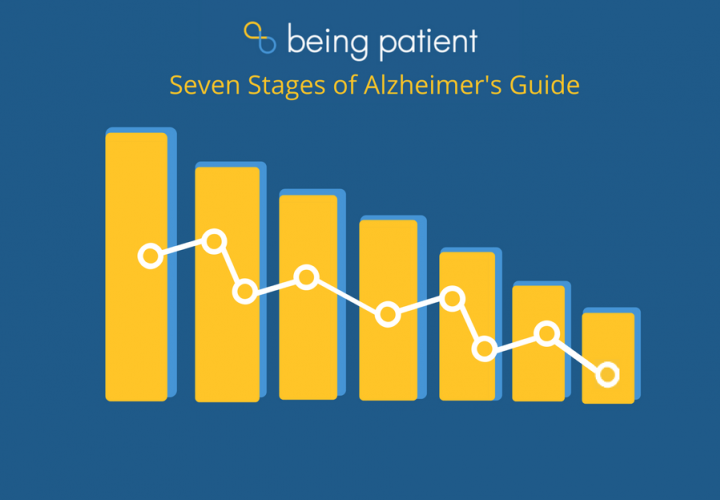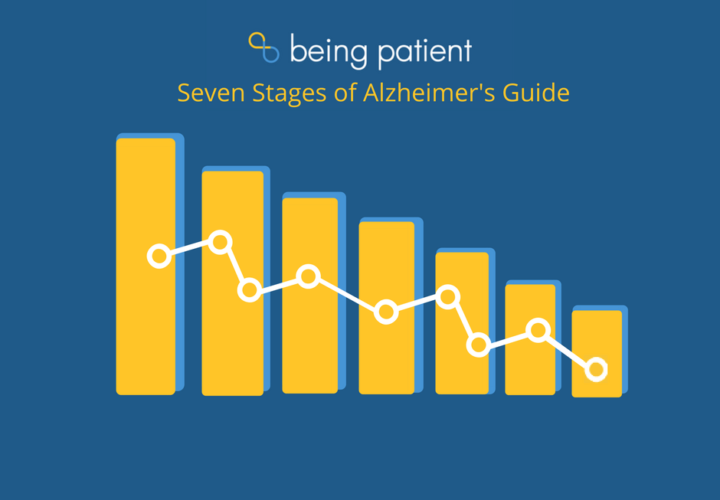While the rate at which Alzheimer's disease progresses varies, it typically moves slowly through seven stages.
Receiving an Alzheimer’s diagnosis often leaves caregivers and patients feeling confused. While the rate at which Alzheimer’s disease progresses varies, it typically moves slowly through seven stages. We’ve developed this guide to the 7 Stages of Alzheimer’s to cover the symptoms your loved one may experience at each stage, from poor short-term memory or major personality changes, to lifestyle changes that may slow the progression of the disease.
The guide to the seven stages of Alzheimer’s also outlines how to support your loved one and plan for the future towards the final stages of Alzheimer’s, including making financial decisions or end-of-life arrangements.

What is the first stage of Alzheimer’s?
Scientists are learning through research that Alzheimer’s actually starts in the brain decades before symptoms appear. In the first stage of Alzheimer’s, a person won’t have memory impairment or other cognitive symptoms that appear as the disease progresses. Rather, in this stage, biomarkers like beta-amyloid protein build up in the brain, detectable via clinical tests like an amyloid PET scan. People may learn they’re in the first stage of Alzheimer’s because they have a family member with the disease.
What you can do as a patient in the first stage of Alzheimer’s
Support your wellbeing by exercising regularly, eating a brain-healthy diet (avoid added sugars and consider anti-inflammatory foods), and getting good sleep.
Consider getting involved in research. If you’ve undergone genetic testing and established that you carry a genetic risk factor for Alzheimer’s, consider enrolling in a clinical trial. (Keep in mind the results of genetic tests have pros and cons, one of the cons being that the results could impact your ability to get long-term care insurance.)
What is the second of Alzheimer’s? Symptoms appear.
In the second stage of Alzheimer’s, you may notice the disease’s early signs and cognitive symptoms: These often include memory lapses. But people in the second stage of Alzheimer’s generally still perform well on memory tests, due to something called cognitive reserve.
While you may be able to detect a difference in your cognition, it can be hard to tell the difference between normal aging and Alzheimer’s at this stage. The best way to gauge a difference is to ask the person closest to you if they’ve noticed a difference in your thinking and memory skills in the last year, according to experts.
What you can do as a patient in the second stage of Alzheimer’s
- Support your wellbeing by challenging your brain with different types of learning, such as learning a new instrument or language. Stick to a regular exercise program. Devise ways to help you remember things (e.g., setting calendar alarms or writing Post-it reminders)
- Assess your risk by understanding the difference between Alzheimer’s and normal aging. In addition, take a baseline cognitive test
What is the third stage of Alzheimer’s?
During this stage, friends and family may notice your memory is getting worse. You may forget the names of new acquaintances, something you just read, lose items, including valuables, or words during conversation. You may have difficulties with planning and organization. Your performance on cognitive tests will be impacted. Doctors may be able to diagnose you with Alzheimer’s using a cognitive test like the MoCA.
What you can do as a patient in the third stage of Alzheimer’s
- Assess your risk by seeing a doctor for assessment and cognitive testing
- Support your wellbeing by staying socially active and engaged. Decide how you’d like to share your diagnosis with family and friends. Make a plan for family and friends to assist with establishing and managing new routines. Read about the latest research and consider clinical trial participation
What is the fourth stage of Alzheimer’s?
Those in the fourth stage of Alzheimer’s may have difficulty with simple arithmetic, forget details of their life history, have poor short-term memory and an inability to manage finances.
What you can do as a patient in Alzheimer’s stage 4
- Support your wellbeing by keeping up with exercise and diet to promote brain health
- Support your loved one by reminding your caregiver how grateful you are they are taking care of you and staying with you on this journey
- Plan for the future by speaking to family about what is important to you in dealing with the later stages of Alzheimer’s disease
What you can do as a caregiver in Alzheimer’s stage 4
- Support your wellbeing by learning to be present with your loved one (LO) as they exist now. Find a support group
- Support your loved one by establishing a new routine or keeping them active and engaged with other people. Get a professional to assess driving capability if they’re still driving. Learn new ways of communicating:
- always agree and never argue
- be patient with repetitive questions
- encourage
- stay positive
What is the fifth stage of Alzheimer’s?
People in the fifth stage of Alzheimer’s may have an inability to recall simple details like phone numbers, require assistance with day-to-day activities like dressing or have significant confusion.
What you can do as a caregiver in Alzheimer’s stage 5
- Support your loved one by investing in a GPS tracking device and home care system. Come up with a plan for administering medication
- Support your wellbeing by learning strategies for coping with difficult behaviors and symptoms, such as angry or violent outbursts and hallucinations. Discover ways to cope with stress and find time for yourself
- Plan for the future by exploring options for longer-term care, either at home or in a facility
What is the sixth stage of Alzheimer’s?
In the sixth stage of Alzheimer’s, you may have an inability to recognize faces, except those of close friends and relatives, experience major personality changes, require daily living assistance, including toileting and bathing, experience a complete loss of bowel or bowel control and start wandering.
What you can do as a caregiver in Alzheimer’s stage 6
- Support your loved one by considering music therapy, which can work well in some late-stage Alzheimer’s patients. Get the necessary equipment to bathe them, including a lifting harness, safety bars and mats
- Support your wellbeing by learning strategies for coping with difficult behaviors and symptoms, such as angry or violent outbursts and hallucinations. Lean on any support you can, since both moral and physical support are important at this stage
- Plan for the future by making end-of-life arrangements
What should families expect in the final stage of Alzheimer’s?
In the final stage of the seven stages of Alzheimer’s, the patient can sometimes utter words or phrases, but will have no insight into their condition, need assistance with all aspects of life, including feeding, toileting or bathing, and may lose the ability to swallow.
What you can do as a caregiver in the end stage of Alzheimer’s
- Support your loved one by speaking to a doctor about medication options to make the patient more comfortable. Communicate with doctors at what point medical intervention should not be considered
- Support your wellbeing by understanding the ways the disease ends and trying to prepare yourself mentally and emotionally
- Plan for the future by looking into palliative care options or preparing for end-of-life arrangements




I feel that my spouse has dementia, or perhaps Alzheimer! I am concerned about his overall well being, as well as my own well being?